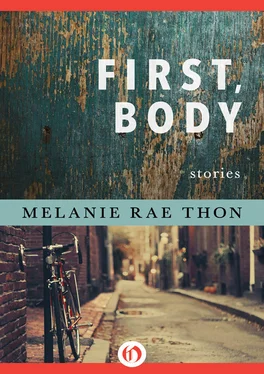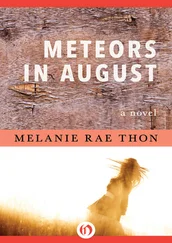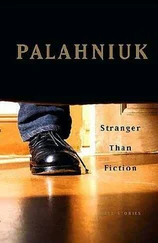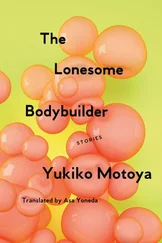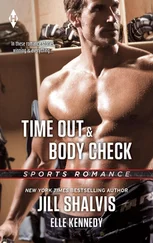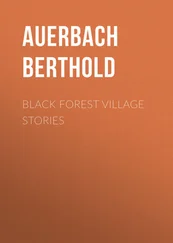Then it was my father’s hand, clamping down.
I am a woman now. I have lovers. I am my mother’s daughter. I dance all night. Strangers with black hair hold me close.
I remember driving home, the three of us squeezed together in the truck. I was the silence between them. I felt my father’s pain in my own body, as if my left leg were withered, my bones old. Maybe I was dreaming. I saw my mother in a yellow dress. She looked very small. A door opened, far away, and she stumbled through it to a field of junked cars.
The windows in the truck were down. I was half in the dream, half out. I couldn’t open my eyes, but I knew where we were by smell and sound: wood fires burning, the barking of those dogs.
I remember my prayers the morning after, boys lighting candles at the altar, my mother’s white gloves.
Green curtain, priest, black box — days later I was afraid of the voice behind the screen, soft at first and then impatient, what the voice seemed to know already, what it urged me to tell. I was afraid of stained glass windows, saints and martyrs, the way sunlight fractured them, the rocks they made me want to throw.
Sometimes my father held me on his lap until I fell asleep. He stroked my hair and whispered, So soft . He touched my scraped shin. What happened, Ada, did you fall down ? I nodded and closed my eyes. I thought about the boys, the gully, the things they stole. I learned that the first lie is silence. And I never told.
Then I was a girl, twelve years old, too big for my father’s lap. I dove from the cliffs into the lake. I told myself the shapes waffling near the bottom were only stones.
I played a game in the woods with my friend Jean. We shot each other with sticks and fell down in the snow. We lay side by side, not breathing. My chest felt brittle as glass. If I touched my ribs, I thought I’d splinter in the cold. The first one to move was the guilty father. The first one to speak had to beg forgiveness of the dead son.
I worked for the doctor’s wife now. My mother’s words hissed against those walls. I knew the shame she felt, how she hated that house, seeing it so close, getting down on her knees to wax its floors, how she thought it was wrong for an old man like my father to shovel a young man’s snow.
But Daddy was glad the snow belonged to someone else. That doctor had nothing my father wanted to own. He said, The cherry trees, they break your heart . He meant something always went wrong: thunderstorms in July; cold wind from Canada; drought. I remember hail falling like a rain of stones, ripe fruit torn from trees. I remember brilliant sunlight after the storm, glowing ice and purple cherries splattered on the ground. My father knelt in the orchard, trying to gather the fruit that was still whole.
Then I was sixteen, almost a woman. I went to public school. I knew everything now. I refused to go to mass with my father. I said I believed in Jesus but not in God. I said if the father had seen what he’d done to his child, he would have turned the gun on himself. I thought of the nuns, my small hands, the sting of wood across my palms. I remembered their habits, rustling cloth, those sounds, murmurs above me, that false pity, poor child , how they judged me for what my mother had done.
I knew now why my mother had to go. How she must have despised the clump and drag of my father’s steps in the hall, the weight of him at the table, the slope of his shoulders, the sorrow of his smell too close. He couldn’t dance. Never drank. Old man, she said, and he was. Smoking was his only vice, Lucky Strikes, two packs a day, minus the ones I stole.
He tried not to look at me too hard. I was like her. He saw Noelle when I crossed my legs or lit my cigarette from a flame on the stove.
He gave me what I wanted — the keys to his truck, money for gas and movies, money for mascara, a down vest, a cotton blouse so light it felt like gauze. He thought if I had these things I wouldn’t be tempted to steal. He thought I wouldn’t envy the doctor’s wife for her ruby earrings or her tiny cups rimmed with gold. Still, I took things from her, small things she didn’t need: a letter opener with a silver blade and a handle carved of bone; a silk camisole; oily beads of soap that dissolved in my bathwater and smelled of lilac. I lay in the tub, dizzy with myself. The dangerous knife lay hidden, wrapped in underwear at the bottom of my drawer. Next to my skin, the ivory silk of the camisole was soft and forbidden, everything in me my father couldn’t control.
The same boys who’d chased me down the gully took me and Jean to the drive-in movies in their Mustangs and Darts. Those altar boys and thieves who’d stolen my butterfly barrette pleaded with me now: Just once, Ada — I promise I won’t tell .
I heard Jean in the back seat, going too far.
Afterward, I held her tight and rocked. Her skin smelled of sweet wine. I said, You’ll be okay. I promise, you will .
I am a woman now, remembering. I live in a trailer, smaller than my father’s cottage. I am his daughter after all: there’s nothing I want to own. I drive an old Ford. I keep a pint of whiskey in the glovebox, two nips of tequila in my purse. I don’t think I know as much as I used to know. I sit in the car with my lights off and watch my father, the slow shape of him swimming through the murky light of his little house. He’s no longer fat and thin. It scares me, the way he is thin alone. He’s had two heart attacks. His gallbladder and one testicle are gone. In January, the doctors in Spokane opened his chest to take pieces of his lungs. Still he smokes. He’s seventy-six. He says, Why stop now ?
I smoke too, watching him. I drink. I tell myself I’m too drunk to knock at the door, too drunk to drive home.
In the grass behind my father’s cottage, a green truck sits without tires, sinking into the ground. If I close my eyes and touch its fender, I can feel everything: each shard, the headlight shattering, the stained glass windows bursting at last, the white feet of all the saints splintering, slicing through a man’s clothes.
Twenty-one years since that night, but if I lie down beside that truck, I can feel every stone of a black road.
Fourth of July, 1971. This is how the night began, with my small lies, with tepid bathwater and the smell of lilac — with ivory silk under ivory gauze — with the letter opener slipped in my purse. I was thinking of the gully long before, believing I was big enough to protect myself.
Jean and I knew other boys now. Boys who crashed parties in the borderlands at the edge of every town.
I asked my father for the truck. I promised: Jean’s house, then up the lake to Bigfork to see the fireworks and nowhere else . I said, Yes, straight home . I twisted my hair around my finger, remembering my mother in a yellow dress, lying to my father and me, standing just like this, all her weight on one foot, leaning against the frame of this door.
We drove south instead of north. A week before, two boys in a parking lot had offered rum and let us sit in the back seat of their car. They said, Come to the reservation if you want to see real fireworks .
We scrambled down a gulch to a pond. Dusk already and there were maybe forty kids at the shore.
We were white girls, the only ones.
Jean had three six-packs, two to drink and one to share. I had a pint of vodka and a quart of orange juice, a jar to shake them up. But the Indian kids were drinking pink gasoline — Hawaiian Punch and ethanol — chasing it down with bottles of Thunderbird. They had boxes full of firecrackers, home-made rockets and shooting stars. They had crazyhorses that streaked across the sky. Crazy, they said, because they fooled you every time: you never knew where they were going to go.
Читать дальше
